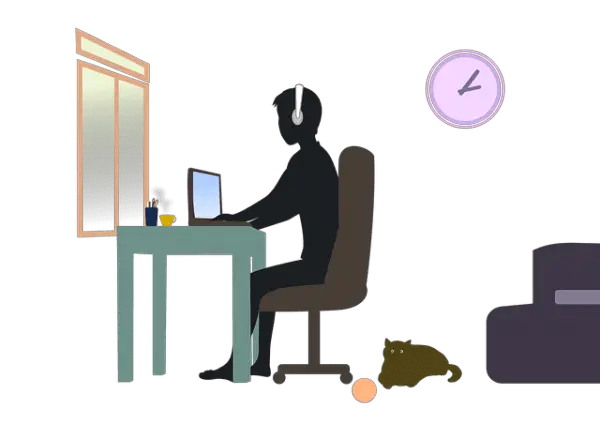As technology continues to reshape the way we work, legal professionals are increasingly seeking efficient and reliable transcription services, and remote legal transcriptionists are in high demand.
In this blog post, we will explore the exciting world of remote legal transcription and shed light on the potential it holds as a rewarding career choice. Whether you are a recent graduate or someone looking to make a career change, let’s delve into the journey of becoming a remote legal transcriptionist and the possibilities it can offer.
Related: Remote Ad Operations Career Path: Everything You Need to Know
Remote Legal Transcriptionist Job Responsibility
As a remote legal transcriptionist, your primary responsibility is transcribing legal documents, recordings, and proceedings into written format. Your work involves listening to audio recordings or reviewing written materials and converting them into accurate and organized written documents. Here are some key responsibilities of a remote legal transcriptionist:
- Transcribing Legal Documents: Listening to audio recordings of legal proceedings, interviews, or dictations and accurately converting them into written transcripts.
- Proofreading and Editing: Reviewing and correcting transcriptions for accuracy, grammar, punctuation, and formatting errors.
- Researching Legal Terminology: Conducting research to understand and correctly interpret legal terminology, jargon, and concepts mentioned in the recordings.
- Maintaining Confidentiality: Ensuring the strict confidentiality and security of sensitive legal information and adhering to privacy regulations.
- Meeting Deadlines: Managing time effectively to meet transcription deadlines and delivering completed transcripts within the specified time frame.
- Communication with Clients: Communicating with clients to clarify any unclear audio or to obtain additional information for accurate transcription.
- Formatting and Document Preparation: Applying appropriate formatting guidelines and preparing the final transcripts in a professional and presentable manner.
- Legal Knowledge and Terminology: Developing and maintaining a strong understanding of legal procedures, terms, and concepts to accurately transcribe legal content.
- Quality Control: Conduct quality checks on transcriptions to ensure accuracy, consistency, and adherence to transcription guidelines.
How to Become a Successful Remote Legal Nurse Consultant
The 7 Tips You Need To Succeed As A Legal Transcriptionist From Home
Becoming a legal transcriptionist from the comfort of your own home can be an excellent opportunity for individuals seeking a flexible work schedule and the ability to work remotely. I mean what’s not to love about it? While becoming a remote legal transcription is not inherently difficult, it cannot be acquired overnight. It requires some training and a learning curve to master. So let’s talk about how you can get started as a remote legal transcriptionist.
1. Develop Strong Typing Skills
The first thing you need to do is to start developing your typing skills. Since legal transcription involves transcribing audio or video recordings into written form, having excellent typing skills is essential. Aim to improve your typing speed while maintaining accuracy. I will discuss other skills you need to get familiar with to succeed as a work-from-home transcriptionist.
2. Familiarize Yourself with Legal Terminology
As you aspire to become a remote legal transcriptionist, you need to understand and accurately transcribe legal terminology. Familiarize yourself with common legal terms, phrases, and concepts. Online legal dictionaries, resources, and even legal transcription courses can be helpful in this regard. I will discuss some of the courses you can take to help you with these terminologies later in the blog.
3. Acquire the Necessary Equipment
Since you will be working from home, you must set up a dedicated workspace at home with a reliable computer, high-quality headphones, and a transcription software program. You may also need a foot pedal to control the audio playback while transcribing.
Here is some software that we found useful for you:
- Transcription Software: Specialized transcription software with features like playback control, foot pedal support, and text expander tools for efficient transcription.
- High-Quality Headphones: Comfortable and accurate headphones that provide clear audio playback to ensure accurate transcription.
- Foot Pedal: A foot pedal enables hands-free control of audio playback, allowing transcriptionists to focus on typing without interruption.
- Computer with Sufficient Processing Power: A reliable computer with sufficient processing power to handle audio playback, transcription software, and multiple
- Word Processing Software: Familiarity with word processing software like Microsoft Word or Google Docs for efficient transcription and formatting.
- Reliable Internet Connection: A stable and high-speed internet connection to download audio files, access online resources, and submit completed transcripts.
- Time Management Tools: Productivity tools like calendar apps, task managers, and time trackers to effectively manage deadlines, prioritize tasks, and stay organized.
- File Storage and Backup Systems: Reliable file storage and backup solutions to securely store and protect completed transcripts and audio files.
4. Enhance Your Listening Skills
Transcribing requires careful listening and attention to detail. Practice active listening by transcribing short audio clips or dictations to improve your ability to catch nuances and accurately transcribe speech. Here are other skills you might need:
- Excellent Typing Speed and Accuracy: Being able to type quickly and accurately is crucial for efficiently transcribing legal documents.
- Proficiency in Legal Terminology: Familiarity with legal terms and concepts is essential to accurately transcribe legal proceedings.
- Attention to Detail: Paying close attention to every word and detail ensures accurate transcription and minimizes errors.
- Grammar and Punctuation Expertise: A strong command of grammar rules and punctuation helps produce polished and professional legal transcripts.
- Research Skills: The ability to conduct research to verify legal terms, case references, and other related information enhances the quality and accuracy of transcriptions.
5. Take a Legal Transcription Course
While not mandatory, enrolling in a legal transcription course can provide you with valuable knowledge, industry-specific skills, and credibility. Look for reputable online courses or certification programs that cover legal transcription practices, legal terminology, formatting, and ethical considerations. Here are some top courses to consider:
- How to Become a Transcriptionist offered by Udemy
- Legal Transcription Certification Course by Transcribe Anywhere
- Online Legal Transcriptionist Training offered by Liberty University
6. Build a transcription portfolio
As you start to gain experience, start building a portfolio of your transcription work. This can include samples of your transcriptions, highlighting different types of legal proceedings, and demonstrating your proficiency in accurately transcribing complex content.
7. Find transcription opportunities
Look for freelance job platforms, legal transcription companies, or law firms that hire remote legal transcriptionists. Networking with legal professionals, joining relevant online communities, or reaching out to legal transcription services can also help you find job opportunities.
Do You Need To Be Certified To Start Working From Home As A Legal Transcriptionist?
Becoming a legal transcriptionist from home does not necessarily require certification. However, obtaining a certification can offer several advantages. It not only distinguishes you from other applicants but also equips you with the necessary knowledge and skills to excel in the role. Moreover, improving your abilities through certification can make the job more enjoyable, as is often the case with many pursuits in life. Some certifications include
How Much Do Remote Legal Transcriptionists Make?
According to ZipRecruiter, the average annual pay for a Remote Transcriptionist in the United States is $65,648 a year. This is approximately $31.56 an hour. This is the equivalent of $1,262/week or $5,470/month.
How to Find Remote Legal Transcription Jobs from Home
Now that you have an idea of what to do to start working from home as a legal transcriptionist, here are some steps you can take to start applying for jobs:
- Create a professional resume: Craft a resume that highlights your relevant skills and experience, even if it’s not directly related to legal transcription. Include any previous transcription work, language proficiency, computer skills, and any legal or paralegal training you may have.
- Build a transcription portfolio: Consider transcribing legal documents or audio files to create a portfolio that demonstrates your abilities.
- Join transcription platforms and websites: There are numerous online platforms that connect transcriptionists with job opportunities. Research and sign up for reputable platforms like Rev, TranscribeMe, GoTranscript, or Scribie. These platforms often have tests or evaluations to assess your transcription skills and determine your eligibility.
- Utilize job search websites: Explore popular job websites like Indeed, FlexJobs, Remote.co, or Upwork, and search for remote legal transcription jobs.
Is Remote Legal Transcription a Good Career?
Remote legal transcription can be a good career option for individuals who have the necessary skills and qualifications. Legal transcription involves listening to recorded audio or video files and transcribing them into written documents, such as legal briefs, court proceedings, or depositions. This type of work can be done remotely, allowing for flexibility and the ability to work from home or any location with an internet connection. Plus it offers a lucrative salary and career advancement.
Conclusion
In conclusion, the career path of a remote legal transcriptionist presents a promising and rewarding opportunity for individuals seeking a flexible and fulfilling career in the legal field. As technology continues to advance, the demand for remote legal transcriptionists is expected to grow, offering a steady stream of job opportunities.







